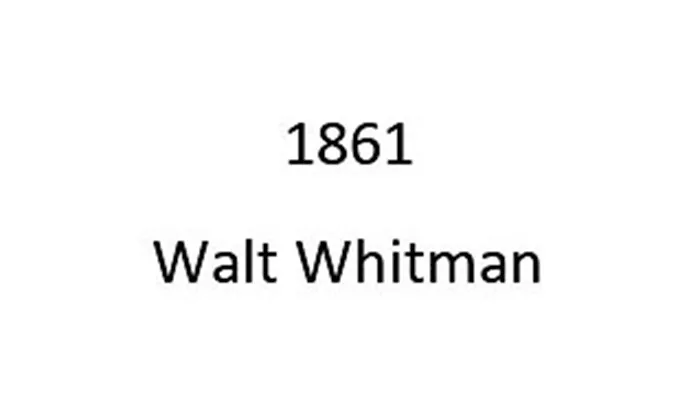Welcome to Poem of the Day – 1861 by Walt Whitman.
1861, a poignant poem, captures a crucial moment in American history: the onset of the Civil War. With vivid imagery and emotional depth, it reflects the collective spirit of a nation on the brink of upheaval. The poem was written by Walt Whitman, one of America’s greatest poets, who masterfully captured the essence of his era through his works. In this article, we will explore the meaning, themes, and significance of 1861, presenting a clear and logical explanation of Whitman’s masterpiece.
1861 Explanation
Background of the Poem
The title 1861 refers to the year the Civil War began in the United States. This was a time of great tension, division, and change. Whitman was deeply affected by the war, as it symbolized both the destruction and the potential rebirth of the American ideal. This poem captures the intense emotions and atmosphere of the time.
Summary of the Poem
In 1861, Whitman describes the energy and fervor surrounding the start of the war. The poem begins with an acknowledgment of the year’s dramatic arrival. The tone shifts as he paints vivid images of soldiers, marching bands, and public displays of patriotism. At the same time, there is an underlying sense of foreboding, as the poet understands the cost of war.
Themes in the Poem
Patriotism and Unity: Whitman portrays the collective spirit of the nation as it rallies for the war effort. People come together with hope and determination, driven by a belief in their cause.
The Cost of War: While the poem celebrates unity, it also foreshadows the sacrifices to come. Whitman hints at the pain and loss that will follow.
Change and Transition: 1861 marks a turning point in American history. The poem captures the tension between the old and the new, as the nation embarks on a transformative journey.
Analysis of Key Lines
“Arm’d year! year of the struggle!”
These opening words immediately set the tone. Whitman addresses the year as if it were a living entity, emphasizing its power and significance.
“Year of the vigilance, and the sleepless watching of troops.”
This line highlights the constant activity and preparedness of the soldiers. It underscores the reality of war, where rest and peace are fleeting.
“Year that suddenly sang by the mouths of the round-lipp’d cannon.”
Whitman uses personification to describe the sounds of war. The image of cannons “singing” reflects both their destructive power and their unavoidable presence.
Significance of the Poem
1861 serves as both a historical document and a timeless reflection on human resilience. Whitman does not glorify war; instead, he presents it as a complex and multifaceted experience. The poem resonates with readers by showing the balance between hope and sorrow, pride and fear.
Conclusion
Walt Whitman’s 1861 is a powerful poem that encapsulates the mood of a nation at war. Through vivid imagery and emotional depth, it captures both the excitement and the gravity of the time. By exploring themes of patriotism, sacrifice, and transformation, Whitman reminds us of the enduring impact of historical moments. His words continue to inspire readers to reflect on the complexities of war and the resilience of the human spirit.

